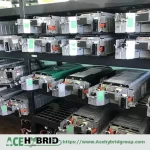 SHOP
SHOP
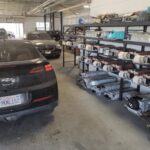 REPLACEMENT
REPLACEMENT
 WORK
WORK
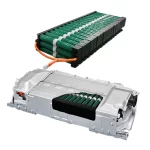 CELLS
CELLS
 LEXUS
LEXUS
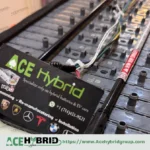 BATTERIS
BATTERIS
 TESLA
TESLA
 TOYOTA
TOYOTA
 NISSAN
NISSAN
 FORD
FORD
 PORSCHE
PORSCHE
 HONDA
HONDA
 KIA
KIA
 HYUNDAI
HYUNDAI
 CHEV
CHEV
 MERCURY
MERCURY
 MAZDA
MAZDA
 GMC
GMC
 CADILLAC
CADILLAC
 BMW
BMW
 DODGE
DODGE
A Hybrid Battery, also known as a Drive Battery or Traction Battery, is an extra large, re-chargeable battery that has the ability to Push a car or a truck; maintain cruising speeds with the gas engine off; and fully power the electric workings of a car or truck (including the air conditioning) in the absence of the gas engine. The Hybrid Battery works in tandem with the gas engine to allow the engine to shut off and save gas when it is not needed for acceleration, thereby increasing both the MPGs and the Range that the vehicle can go on a tank of gas.
The Hybrid Battery is part of a Hybrid “System.” The Hybrid System has Eight main parts: The Inverter, DC/DC Converter, Hybrid Battery, Regenerative Brakes, Transmission, Electric Motor, 12-Volt Battery, and Computer Software that regulates the whole System.
The Inverter is an intelligent unit that controls the speed of the Electric Motor, and the charge of the Hybrid Battery. It changes the voltage from AC to DC in order to charge the battery; and DC to AC in order to power the Electric Motor.
The DC/DC Converter is usually separate from the Inverter, but sometimes they are one unit. It converts High Voltage DC electricity to a lower 12-Voltage DC electricity, in order to power the 12-Volt Battery- which in turn powers all of the electrical components in the vehicle.
Regenerative Brakes work with the Electric Motor to slow a hybrid vehicle down. When you press the brake pedal, the Electric Motor slows the vehicle down and allows electricity to be harvested that can recharge the Hybrid Battery. Your hybrid vehicle uses less actual brake pads and discs, therefore Brakes last longer on a hybrid vehicle than on a gas only vehicle.
When your hybrid vehicle is in Coasting mode (no gas pedal or brakes being applied) your Transmission also recharges your Hybrid Battery.
The Electric Motor is usually inside the transmission on a hybrid vehicle. It is powered by the Hybrid Battery, and pushes the hybrid vehicle, when the vehicle is in EV Mode.
Every car or truck has a 12-Volt Battery which powers all of the electrical functions in the vehicle. On a Hybrid Vehicle, the 12-Volt Battery is charged by the Hybrid Battery, instead of an alternator.
Finally, the computer software in a Hybrid Vehicle regulates the whole system. It determines when the Inverter should start charging, and when it should shut off, for example. It also determines when your gas engine should shut off, and switch to EV Mode, and vise versa. In addition, the software also monitors your hybrid system and will trigger a warning light if something is not working properly.
The price of a replacement Hybrid Battery depends on the type and size of the battery as well as the car’s Make and Model. It also depends on whether you are buying one brand new from the dealer, or buying a re-manufactured one. They tend to range from $950.00 to $12,500.00
There are Two Main Types of Hybrid Battery that are used in hybrid vehicles today.
1) Nickel-Metal Hydride (NiMH)
The Nickel-Metal Hydride Hybrid Batteries are cheaper than Lithium-ion Hybrid Batteries. This affects both the original sticker price of the vehicle, as well as the replacement cost, when the Hybrid Battery needs to be replaced. They are durable, and have a long life span of approximately 80,000 to 180,000; or 8 to 10 years, depending on use and/or abuse.
They are prone to heat generation and are usually fan cooled. They are also prone to self-discharge, so it is not good to let them sit unused for long periods of time.
The NiMH is heavier than Lithium-ion, and not as powerful. Both of these factors result in the NiMH not achieving as much MPG savings as a Lithium-ion Hybrid Battery.
NiMH Hybrid Batteries are easier to repair or re-manufacture than Li-ion Hybrid Batteries. A re-manufactured Hybrid Battery can save a consumer thousands of dollars compared to a new one from the dealer, when it is time to replace it.
2) Lithium-ion (Li-ion)
The Lithium-ion Hybrid Batteries charge at about the same rate as the NiMH batteries, but discharge more slowly, thereby giving more sustained power. This will keep the vehicle in EV Mode for longer periods of time, resulting in better MPG savings than the NiMH Hybrid Batteries.
The Li-ion Hybrid Batteries are also lighter weight than NiMH, and more powerful, both of which also contribute to greater MPG savings.
Li-ion Hybrid Batteries have a slightly longer life span than NiMH, which can help offset the fact that they are more expensive than NiMH Hybrid Batteries. Li-ion Hybrid Batteries can last 150,000 to over 200,000 miles; or 10 to 12 years, depending on use and/or abuse.
Li-ion Hybrid Batteries are also prone to heat generation, and need to be cooled, either with a fan or liquid. However they are less prone to self- discharge than NiMH, which means they are more stable when sitting for periods of time. However, it is also not good to let them sit unused for long periods of time.
Most Fully Electric Vehicles use Li-ion because they require more strength and durability than hybrid vehicles do. In addition, All-Electric Vehicle batteries are much larger than Hybrid Batteries; therefore the lighter weight of the Li-ion becomes a big factor.
3) Lead-Acid
Although they are no longer in use by any major car manufacturer, Lead-Acid Hybrid Batteries deserve a mention because they are the oldest type of Hybrid Car Battery. Lead-Acid battery technology can be found in many 12- Volt car batteries. Lead-Acid batteries work fine for the purpose of powering all of the electronics in cars and trucks, but aren’t real practical as a Hybrid Battery because of the battery size that is required to propel a large vehicle. They are not only bulky, but heavy, less efficient, and have only about one half the life span of the NiMH and Li-ion Hybrid Batteries.
The Early Warning Signs that your Hybrid Battery needs to be replaced are:
1) Your Mileage, and the Age of your car are nearing the expected Life Span of your particular Hybrid Battery.
2) Your Fuel Efficiency, or Miles Per Gallon (MPGs) are starting to drop.
3) The vehicle doesn’t stay in EV Mode with the engine off, as long as it used to.
4) Reduced Performance, or sluggishness, especially from 0 to 25 MPH. The gas engine may kick in quicker than it used to, from a dead stop.
The Immediate Warning Signs that Your Hybrid Battery is Out, and Needs to be Replaced:
Your first indication will be Warning Lights on your dashboard. The Hybrid System is run by software, and monitored full time while driving, so the computer will sense when your Hybrid Battery has dropped in Capacity, to the point that the vehicle can no longer utilize the Hybrid Battery the way it was designed to do. That will trigger the Warning Lights.
The second indication is that your vehicle will no longer stay in EV Mode for more than a couple seconds, if it even goes into EV Mode at all.
Third, in the case of some Toyota, Lexus, Nissan, Infiniti, and General Motors vehicles, the Battery Fan will kick into High and become noticeably louder, when the Hybrid Battery goes out.
*To know for sure whether or not your Hybrid Battery needs to be replaced, a simple OBD Scan (On Board Diagnostics) will read your computer and report any Error Codes, including “Replace Hybrid Battery Pack.” Since 1996, all vehicles are required to have an OBD port to read the vehicle’s computer. Most Auto Parts Stores and Auto Repair Shops will scan your car for Free, just as We do, at Ace Hybrid Tech.
A simple Pass/Fail test of your Hybrid Battery can be done using an OBD scanner. If there is no error code that is reporting that your Hybrid Battery needs to be replaced, than it is still functional.
There are also a few aftermarket Apps, such as Dr. Prius, Hybrid Assistant, and Techstream that can be downloaded and/or purchased, which can give a better idea of your Hybrid Battery’s state of health. These utilize an OBD reader that plugs into your OBD port, and Bluetooth technology to communicate to the App on your smart phone or laptop. The i-phone uses an OBD reader named Veepeak to communicate; While the Android phones use an OBD reader named Elm 327.
Other than that, a Hybrid Battery has to be uninstalled from the vehicle; taken apart; and all of the cells tested individually. This is generally not going to be cost effective unless you endeavor to do it yourself.
*The technicians at Ace Hybrid are Hybrid Specialists that are formally trained, unlike many Hybrid Start-ups.
*We have been in business for over 10 years, and our technicians have a combined Decades-long experience solving Hybrid Problems, and fixing both Hybrid Cars and Trucks.
*Unlike most Hybrid Shops, we at Ace Hybrid can service almost any type of Hybrid car or truck. Most shops only service the Prius, or Toyota/Lexus products.
*Our Warranties set us apart in the industry. Our products are all supported by our generous warranties, which mean zero cost to you for parts and labor, in case one of our batteries fail.
*We are Experts in re-manufacturing Hybrid Batteries! Our re-manufactured Hybrid Batteries can save you Thousands of dollars, compared to taking your vehicle to the Dealer!
We take Credit and Debit Cards, Business Checks, Cash, and Zelle.
Credit Card and Debit Card Processing will cost 4% more.
I.D. is required for all transactions.

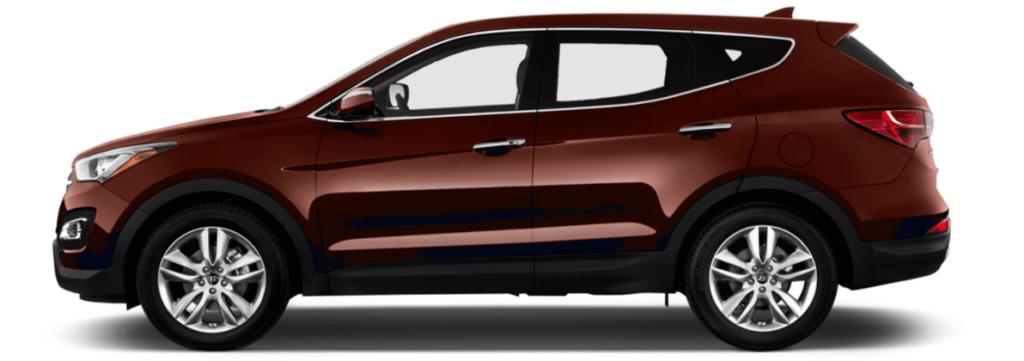

 Ace Hybrid Tech | Hybrid battery replacement
Ace Hybrid Tech | Hybrid battery replacement